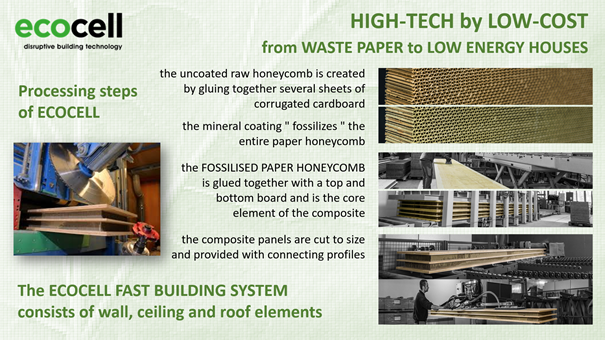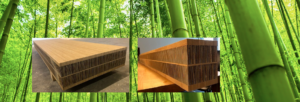green investment opportunity

EXECUTIVE SUMMARY
Background
Impact on the environment
Today, houses are usually built with building materials such as concrete, steel, bricks or wood, and petroleum-based polystyrene is used for their insulation. These used building materials consume extremely large amount of natural resources such as gravel, sand, wood and oil. An unimaginable 15 billion tons of sand are mined worldwide every year. Even a single family home requires 200 tons of sand. The construction industry also causes over 20% of all CO2 emissions worldwide and generates over 30% of all waste. The respective deconstruction and disposal often turns out to be problematic, often has to be declared as hazardous waste and causes high costs for a correct disposal.
Inefficient construction
Another problem with the entire construction industry is, that every building is basically a prototype. Each and every construction requires many machines on the site, such as excavators, cranes, cementmixers and even professionals from all different disciplines. You start from zero on every project and there is no such thing as any kind of system. This results in long construction times, leads to inefficiencies and ends often and regularly with mistakes with the consequence of high an unnecessary costs.
Business idea
Building with recycled paper and sustainable raw materials
Building dreams should be possible in the future with a good ecological conscience. The invention presented here is a new type of building material made from recycled paper, which can be used to build houses ecologically and insulate them without mineral oil-based insulating materials. The result is a building made of recycled paper.
The technology of the building material is based on the invention of a “fossilized” paper honeycomb. It combines expertise from architecture and engineering, as well as the paper and construction industries. With its honeycomb structure, the “fossilized” paper honeycomb is modeled on the honeycomb of bees, gives the building material stability, and is made from 100% recycled paper. The coating is a secret recipe, based on a mineral coating and petrifies the honeycomb structure from recycled paper.
The result is a building material with high load-bearing capacity. You could put 200 VW Beetles on one square meter of the honeycomb – the building material holds up. You could also put it on fire with a direct flame – the building material will last. Of course, the building material made of paper is also water-repellent.

Building with LEGO modules
If the “fossilized” paper honeycomb is now bonded as a middle layer with a lower and upper panel to form a sandwich, the result is a highly resilient composite material and thus a statically resilient building element. These elements are manufactured directly in the company’s own factory and are available in different sizes and variants. The result is a modular fast-build system that is very similar to the LEGO building blocks we are familiar with. By moving the manual work from the construction site to the factory, the construction time is shortened by at least 70% and the costs can be reduced by at least 20% – and this with 100% best conscience towards the environment.

Products and markets
Substitute for polystyrene
The “fossilized” paper honeycomb does not contain any mineral oil-based substances and can be used as a semi-finished product to replace, among other things, the petroleum-based polystyrene, used for insulation in house construction. The market size is estimated at approximately US$15 billion worldwide, of which the U.S. is credited with over US$2 billion. This market has not yet been tapped, but could represent a market share of approximately US$ 300-500 million within the next five years, only for the American market.

Fast building system
As a prefabricated product – i.e. as a fast building system – the “fossilized” paper honeycomb is used for the construction of partition walls, but also for the construction of entire single-family, duplex- and multi-family-houses. The proof of concept has already been provided with the first four show houses and ten duplex-houses. Companies such as Swisscom and Die Post have been won over for the modular partition walls. The Swiss market alone is estimated to have a market potential of over CHF 100 million, that could be achieved in the next five years.
Climate protection
The business idea meets today’s spirit and remains at least the trend for the next 30 years. ECOCELL provides ecological construction and sustainability – i.e. recycled paper, wood and bamboo – with economic benefits. The products make sense and even removes CO2 from the atmosphere to an enormous extent. A business idea conform for a caring, sustainable investor.

Current situation and financial needs
So to speak, the original idea was born in the barn of Fredy Iseli‘s former cardboard factory. The technology and product development, as well as the construction of machine prototypes, the application of patents and the apprenticeship costs for the process development for the first show houses have cost far more than five million Swiss francs, which have so far been financed by family and friends.

Swiss manufacture, expansion and licensing
The next logical step is now to conquer markets. Everything is ready: the technology, the products, the markets and the vision. The last ingredient is needed: capital. CHF 3 to 5 million is needed to create a professional Swiss manufactory. With this, a market volume of up to approx. CHF 20 million/year can be conquered. For a somewhat sportier, more expansion-oriented market conquest, full automation is recommended. This requires about CHF 15 to 25 million and can serve a market volume up to about CHF 100 million. The business concept of ECOCELL is to use the Swiss manufactory as a showcase company, so that third parties in other countries and own business case, machines and equipment can be sold and licenses granted.

Klicke hier, um Ihren eigenen Text einzufügen
Klicke hier, um Ihren eigenen Text einzufügen
